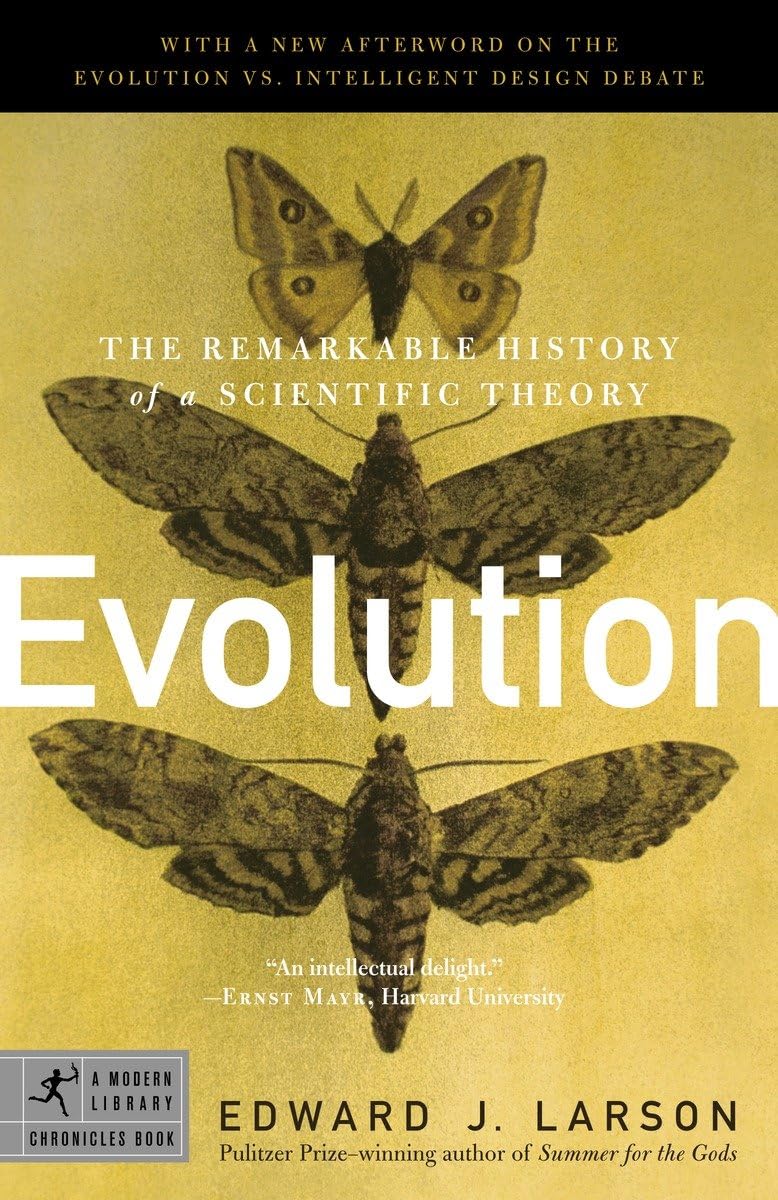Customer Services
Copyright © 2025 Desertcart Holdings Limited


Evolution: The Remarkable History of a Scientific Theory
S**1
Excellent book about evolution
Excellent book about evolution, Darwinism and more. Great if you're interested in getting information on the theories, discoveries and figures in this study of nature.
W**.
Remarkably fitter than most
I have remarked elsewhere (somewhat controversially) that relatively few people, even biological scientists, really understand the Principle of Evolution. You will not become one of those few by reading this book. But what you will learn will be, to use the author's words, "remarkable." I have been a biologist for 30 years now and I learned something new from each page, not about biology but history, just as the subtitle says.The author, Edward Larson is a professor in the School of Law at Pepperdine University. He has a Ph. D. in History from the University of Wisconsin and a J.D. from Harvard. He has several other works on the interaction between science and religion and works on various aspects of the legal history of the United States. His authority on this subject is well established.The book starts in France, in the midst of the enlightenment, with the story of the man who managed to squash any real discussion of evolution throughout his lifetime and for 30 years after, Georges Couvier, the granddaddy of modern comparative anatomy. He argued against any form of gradual speciation on the grounds that the organ systems of each species were too essentially integrated to allow for any variation. Variation would lead to death, which happens to be right most of the time, and the essence of Couvier's argument remains at the heart of the objections of the advocates of Intelligent Design yet today. Couvier spent his career making sure that Lamarck's "ascending escalator" of species never got off the ground and the story of these two men and the changing ideas of the early 19th century is worth the price of the book.But the origins of evolution are more to be found in fossils than finches, so the book turns to the work of Charles Lyell and the other rock choppers of England who founded simultaneously the sciences of geology and paleontology. It was Lyell's book, "Principles of Geology" that Darwin read and reread on that five year journey of the Beagle. It was Lyell that allowed Darwin to see back through the time available and necessary for evolution. Lyell's work was the bedrock on which Darwin eventually constructed his theory using the bricks and mortar supplied by Thomas Malthus. Darwin took his time with this construction and it's unveiling and this makes for a good story.Professor Larson then describes the fanatical proselytizing for the ideas of evolution by "Darwin's Bulldog", Thomas Huxley, and Darwin's cousin, Francis Galton, the founder of Social Darwinism. One of the weakest points of the book is the author's failure to explore adequately the fact that the fervor of these men was every bit the equivalent of that of those similarly well-meaning folk who opposed the teaching of evolution insisting on Heavenly mechanisms 60 years later. The acceptance of both God and science by Darwin's American ally, Asa Gray, likewise remains unexplored. Huxley and Galton embraced the science so they might free themselves from religion, but that embrace is then how science becomes a religion, as it has for many people. That religion of science can lead to the same irrationality sometimes found in other religions. Social Darwinism has killed far more people than the Crusades.The book also struggles in places as it progresses through the 20th century, but then the science does start to get trickier here. The treatment of Mendel (his work was not discovered until the 20th century so it is dealt with here) is appropriately generous and that of Jay Gould appropriately harsh. The appeal here is the description of the scientists who followed Darwin to found modern genetics (lot of founding going on around this, hmmm), their lives and their interactions with each other which slowly lead to the synthesis of genetics and natural selection that we now call evolution.The book regains its stride in its discussion of the rejection of evolution by many in the United States in the 20th century and of the Scopes Monkey Trial. But it should, Professor Larson has written another book on just that subject, "Summer for the Gods", the book that evidently lead him down this historical path. The movie "Inherit the Wind" is a lie and Professor Larson says so. But while the treatment of the deniers of evolution is fair, accurate and measured, the undertone of scorn is unmistakable.For those who do want to know the science before they read this book, the starting point is easy - Darwin. Origin of the Species is easily the best non-fiction book of the 19th century and the corner stone of modern biology. For those who really want to try to understand the science, I recommend Douglas Futuyma's text, "Evolution." For those who just want to know the "remarkable history of a scientific theory" this is your place.
O**+
Excellent overall look at theory of evolution
Book covers the theory of Evolution from pre Darwin through and up to today including an in-depth discussion of human and social evolution. I find this an excellent overall look at the theory and all of its ramifications and interpretations throughout history.
M**R
Review of Evolution by Larson
Very well presented, but like most terrestrial (vs marine) evolutionist, he completely ignored the Aquatic Ape Theory, and other theories, such as the influence of nutrition on evolution.He also does not refer to Behe's "Darwin's Black Box" and responses to it.I recommend any of the books by Elaine Morgan.I also recommend Maichael Crawford's "The Driving Force".
M**1
Worked for Class
I thought this book was interesting, but a bit slow. It worked very well for class, though, and it came in great condition.
Trustpilot
2 months ago
3 weeks ago